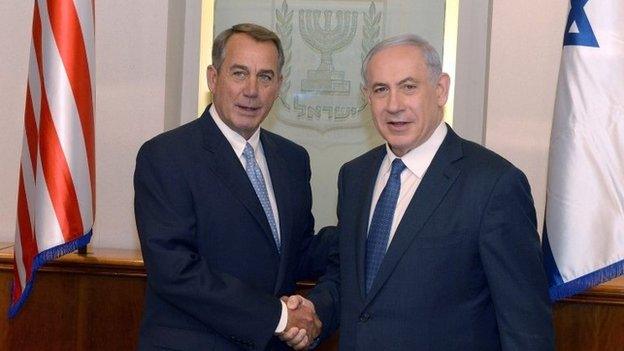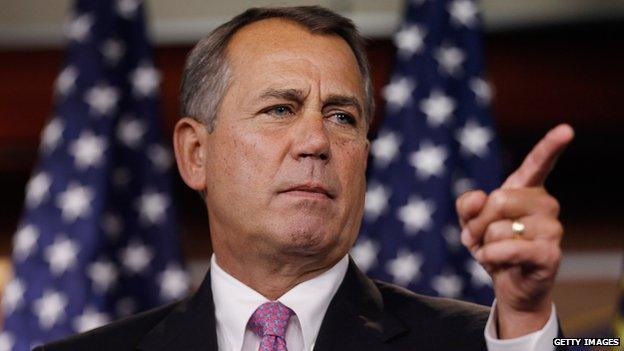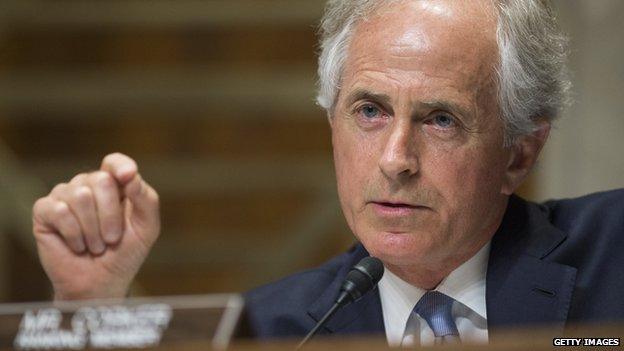Iran nuclear deal: Can the US Congress sabotage it?
- Published

Deal breakers: Republican John Boehner and Israel's Benjamin Netanyahu have become close
White House officials are pleased with a new framework with Iran. Republicans in Congress, however, remain sceptical.
Officials from Iran and six other countries, the US, Britain, France, Russia, China and Germany, have agreed on a framework for ways to contain Iran's nuclear programme. It provides guidelines for a more lasting agreement, one that is supposed to be reached by 30 June.
Mr Obama hailed the framework as "historic". If the deal goes through in the summer, it will be a landmark foreign policy achievement. The deal with Iran - and his legacy - are at stake. First, though, he has to overcome resistance in Washington.
"If Congress kills this deal not based on expert analysis, and without offering any reasonable alternative," he said after the agreement was announced, "then it's the United States that will be blamed for the failure of diplomacy."
"What can Congress do to blow this up?" said Joseph DeThomas, a former advisor on non-proliferation for the US State Department. "Well, Congress can do lots of things."
Members of Congress can hold hearings, calling witnesses to testify about the dangers of the agreement and in this way "embarrass the administration," he said. Witnesses could testify about the dangers of an agreement, for example, and about flaws in the administration strategy.
Members of Congress could refuse to appropriate funds necessary for an agreement with Iran to go into effect. This would delay - and perhaps derail - the agreement. There are other options, too.
On 14 April members of the Senate Foreign Relations Committee are planning to vote on Senator Bob Corker's bipartisan Iran nuclear agreement review act, as it's known. This would give members of Congress 60 days after a nuclear deal is reached to decide if they want to waive sanctions against Iran.
"We must remain clear-eyed regarding Iran's continued resistance to concessions," said Sen Corker, a Republican from Tennessee. Mr Obama said he wants the sanctions against Iran lifted - and has made it clear he would veto the measure.
Nevertheless members of Congress could decide to up the ante and impose "pretty draconian new sanctions", NYU School of Law's Zachary Goldman said. It would be hard, since they'd need the support of two-thirds of both the US Senate and the US House of Representatives to over-ride a presidential veto. Both houses are Republican-controlled but they would need Democrat votes.

House Speaker John Boehner invited the Israeli prime minister to speak to Congress
With a presidential campaign under way, though, the atmosphere is charged. US Senator Marco Rubio, a Republican of Florida with White House aspirations, attacked the framework, saying: "This attempt to spin diplomatic failure as a success is just the latest example of this administration's farcical approach to Iran."
Gov Scott Walker of Wisconsin, who's likely to be a candidate for the Republican presidential nomination, said, external he would - if elected - renege on any deal with Iran.
Meanwhile Representative Michael McCaul, a Republican from Texas, sent out a statement that warned: "Iranian leaders will now find a nuclear weapon dangerously within reach."
An agreement with Iran has become a "a loyalty test" for Republicans, said Mr DeThomas. Representative Gerald Connolly, a Democrat from Virginia, said many Republicans had already made up their mind - before they even saw the framework. "I think it's very cynical," he said.
In this atmosphere, lead Republicans could lash out at the White House and the diplomats in Switzerland, Mr DeThomas said: "They can say, 'We don't care what you agreed to. We will put the following sanctions on Iran.'"
He added: "That would break the agreement." He said he'd be surprised. Yet he pointed out that members of Congress have recently taken unusual steps regarding Iran.

Republican Senator Bob Corker said Americans should remain "clear-eyed" about Iran
The speaker of the US House of Representatives, John Boehner, a Republican, invited Israeli Prime Minister Benjamin Netanyahu to give a speech. Then Republican members of Congress sent a letter to Iranian leaders, telling them a future president could renege on promises made by the current one.
If members of Congress managed to override the president's veto and impose harsher sanctions, the consequences would be far-reaching.
"What do you think the other great powers of the world are going to say? Then it's not P5-plus-1 against Iran," said Mr DeThomas, referring to the permanent members of the UN Security Council plus Germany. "It's P4 against the US."
Mr Goldman said: "Additional sanctions would be destructive." He added: "The negotiating process is not done." Neither is the controversy. Members of Congress will make more of their views known in the coming weeks and months - and negotiations will continue in the summer.
Follow Tara McKelvey, external on Twitter.